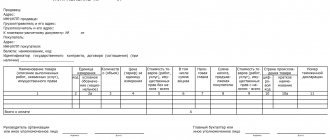- Mandatory Conformity Form
- What is the difference between a certificate of conformity and a declaration of conformity
- Violation of legislation in the field of certification and declaration of products
- Liability of applicants
- Responsibility of certification bodies
- Responsibility of testing laboratories
- Summary table of fines
Mandatory Conformity Form
A certificate of conformity and a declaration of conformity under the Law “On Technical Regulation” are two forms of mandatory certification of products to meet the requirements of national standards, Technical regulations, rules or other regulatory documents. Both documents have equal legal force on the territory of the Russian Federation during the validity period of both documents.
Since 2013, when the Customs Union was created, documentary confirmation of product conformity began to be carried out not only in the GOST R system, but also in accordance with technical regulations. A mandatory declaration or certificate of the Customs Union (and currently the Eurasian Economic Union of the EAEU) confirms that the imported product is permitted for use in the zone of the Customs Union (EAEU), due to its full compliance with the declared safety parameters with the requirements of technical regulations.
Main differences between the two documents
A quality certificate (QC) is a document of limited significance, which is issued by a product manufacturer without the involvement of competent authorities. This means that the examination is carried out on the basis of the enterprise, and based on its results, its own internal certificate is developed.
As for the certificate of conformity (CC), this is an official certificate drawn up on a standard form. This type of certificate is issued by an accredited certification body based on tests carried out in a specialized laboratory.
The requirements, norms and rules by which the quality of manufactured goods is checked are contained in national and international documents. The GOST R certificate of conformity confirms that the products were manufactured in accordance with the provisions of state standards, and, in this regard, is valid only within the Russian Federation. The permit obtained under the CU TR has legal significance on the territory of the five states that are part of the Eurasian Economic Union.
What is the difference between a certificate of conformity and a declaration of conformity
Despite the fact that a certificate of conformity and a declaration of conformity are two forms of mandatory confirmation of conformity, the differences between them are as follows:
- If a certificate is obtained, the manufacturer shares responsibility for the information included in the document itself and for the safety of the product with the certification body where the conformity confirmation document was issued. While upon receipt of a declaration of conformity, all responsibility remains with the product manufacturer (or other person performing the declaration).
- In case of receiving a certificate of product conformity, the document is filled out on a special printed form that is protected from counterfeiting. The declaration of conformity of products is filled out on plain white A4 paper. There are established requirements for the preparation of this document. As a rule, the certification body provides its clients with samples of declarations of conformity for the correct execution of the permit document.
- When conducting tests to obtain a declaration of product conformity, the law provides for declaration schemes, when it is enough for the applicant to provide test reports carried out in the goods manufacturer’s own laboratories, i.e. based on our own evidence of product safety. When conducting tests to obtain a certificate of conformity, there are no certification schemes that provide for the use of the applicant’s own evidence base (with the exception of scheme 9c). The adoption of a declaration of conformity can be carried out on the basis of two types of declaration schemes: on the basis of the applicant’s own evidence or with the participation of a third party. As a third party, the law allows for the involvement of a certification testing laboratory, where independent tests of product samples are carried out.
- Certification schemes and declaration schemes are usually different from each other. Most often, when issuing certificates of conformity, there are a larger number of permitted certification schemes than when issuing a declaration of conformity. But even when receiving a certificate of conformity and when drawing up a declaration of conformity, production quality certificates (certificates of enterprise management systems) are accepted as additional evidence of product safety and quality.
- Issuing a certificate of conformity always requires confirmation of compliance with a certain set of standards, which are specified in the Technical Regulations or in the Decree of the Government of the Russian Federation, which determine the obligation to issue a certificate of conformity for a specific type of product. When drawing up a declaration of conformity, the applicant indicates the specific regulatory documents in accordance with which the products were manufactured and the compliance of which is assessed for conformity.
- When issuing a certificate of product conformity, this document is entered into the state register of certificates of conformity and is assigned a unique registration number. The same thing happens with the declaration, which is registered in the state register of declarations of conformity. These documents are registered in different registers, with different codifications, i.e. must have different registration numbers.
Product quality certificates and quality passports - what is the difference?
Many people confuse a certificate and a quality passport. In fact, these two documents have nothing in common. In the second case, we mean a document that contains detailed information about the manufacturer, batch number, shipment date, as well as information about available certificates and tests that were passed before receiving the confirmation document.
Such passports are valid only on the territory of the Russian Federation.
Violation of legislation in the field of certification and declaration of products
Violation of the law in terms of the lack of mandatory permits for products entails administrative liability. This is established in Articles 4 and 7 of the Law of the Russian Federation No. 2300-1 “On the Protection of Consumer Rights” dated February 7, 1992. Without a certificate or declaration of conformity of goods, the safety of which must be confirmed in the process of mandatory certification or declaration, legal release in circulation of such products.
The mandatory availability of permits for goods intended for sale in our country is also regulated by Federal Law No. 184-FZ “On Technical Regulation” of December 27, 2002 (hereinafter referred to as Federal Law No. 184), which contains general mandatory requirements for design, production, as well as sales of various product groups. The law establishes possible forms of confirmation of conformity, in particular mandatory certification or declaration, and documents defining these requirements.
At the moment, for most groups of goods, mandatory safety standards are enshrined in the technical regulations of the Customs Union. The documents also stipulate the requirements for obtaining, storing, and providing, if necessary, certificates, declarations, test reports, as well as other materials confirming the safety of products.
Requirements for the sale of products were adopted by Decree of the Government of the Russian Federation No. 918 “On approval of the rules for the sale of goods based on samples” dated July 21, 1997, which also established the need to obtain permits for products that are subject to mandatory safety standards (Article II, paragraph 30).
Scheme 1. Legislation in the field of ensuring product conformity
The degree of responsibility for violation of the law is established in the Code of the Russian Federation No. 195-FZ “On Administrative Offenses” of December 30, 2001 (hereinafter referred to as the Code of Administrative Offenses of the Russian Federation), namely Chapter 14 “Administrative Offenses in the Field of Entrepreneurial Activities”.
What is a quality certificate?
Quality certificate is a conclusion confirming the compliance of a product or service with current regulatory documents in the country or the world on product quality issues. In addition, a special sign may be issued with a license for the right to use this symbol, certifying a high level of quality.
Some goods cannot be sold or even produced in the absence of this conclusion, since they are subject to mandatory certification. Among them:
- automobile production and repair;
- gas and electrical equipment;
- Construction Materials;
- construction, etc.
This document can also be obtained voluntarily for any product or service provided if standards have been developed for them.
The presence of a voluntary (optional) certificate is a powerful advertising tool that allows you to attract the attention of consumers, as well as increase the cost of the product.
What are they: for products, goods, services
Federal Law No. 184-FZ of December 27, 2002 “On Technical Regulation” establishes the procedure for certification in organizations accredited by Rosstandart, as well as a list of goods and services for which this procedure is mandatory. This regulatory act also determines the types of documents that can be drawn up based on the results of tests and research.
Decree of the Government of the Russian Federation dated December 1, 2009 No. 982 “On approval of a unified list of products subject to mandatory certification and a unified list of products, confirmation of conformity of which is carried out in the form of a declaration of conformity” establishes the obligation to undergo the certification procedure for a number of products. Services are not included in this list; they require a voluntary procedure.
What does it look like?
and get acquainted with what a quality certificate for products should look like.
The form of the certificate is determined by GOST, for compliance with which the products are tested. For example, GOST R 57141-2016 contains Appendix A, according to which the Rosstandart laboratory will issue a conclusion on the compliance of a given batch of porcelain tiles with technical requirements. If the technical regulations do not contain information about the form of the certificate, then when filling out the conclusion you will be guided by Order of the Ministry of Industry and Energy of the Russian Federation dated March 22, 2006 No. 53 “On approval of the form of the certificate of product conformity to the requirements of technical regulations.”
What should be reflected?
In any case, the certificate is a paper document with the signature and seal of the organization that issued it. In this case, the conclusion itself will reflect mandatory information, the content of which is determined by Article 25 184-FZ:
- name and address of the applicant, manufacturer and certification organization;
- identification information on the object of study and the technical regulations for compliance with which the tests were carried out;
- information about studies and submitted documents;
- validity period of the conclusion;
- information on the use of national Russian standards.
When carrying out certification according to GOST R, it will be mandatory to reflect the following points in the document:
- product code according to the product nomenclature;
- personal data and signature of the head of the Rosstandart laboratory.
The Customs Union of Russia, Belarus and Kazakhstan includes personal data and the signature of the expert performing the compliance check as mandatory information.
The entrepreneur has the right to provide customers with a copy of the certificate, certifying it with his seal. In this case, the copy must indicate the seller’s contact information – address and telephone number.
Liability of applicants
The applicant’s responsibilities in the field of mandatory confirmation of product safety, both during certification and when declaring conformity, are regulated in Article 27 of Federal Law No. 184.
The applicant must:
- ensure product compliance with the requirements of technical regulations or other regulatory and technical documents that impose mandatory safety requirements for products;
- release into circulation products subject to mandatory confirmation of conformity only after such confirmation of conformity has been carried out;
- indicate in the accompanying documentation information about the certificate or declaration of conformity;
- stop selling products if the certificate or declaration is suspended or the documents have expired;
- notify the certification body of changes made to technical documentation or technological processes for the production of certified products, etc.
In addition, the provisions of the technical regulations of the Customs Union establish that the applicant is obliged to store test reports obtained in the process of declaring conformity based on its own safety justifications for 5 years after the expiration of the declaration.
For violation of obligations, the applicant bears administrative liability in accordance with the legislation of our country. The fines for each type of violation are indicated in the summary table of fines.
Is it possible to replace one document with another?
It is important to remember that if a product is subject to mandatory certification, then the procedure cannot be replaced by declaration. However, if the manufacturer decides to carry out a more strict procedure instead of declaring, such actions are legal if this is provided for by the technical regulations.
Within the GOST R system, it is impossible to replace one procedure with another.
If we are talking about a customs declaration, then this document cannot replace any certification permit.
Responsibility of certification bodies
The tasks of the certification body include issuing mandatory certificates, as well as registering declarations of conformity of various product groups. The applicant receives documents only after verification by specialists from the following authorities:
- the correctness of all materials for the product, the applicant, indicating registration and constituent documents;
- the degree of compliance with established requirements in technical regulations, standards and other regulatory and technical documentation;
- correctness of OKPD2/TN VED codes of the EAEU products;
- reliability of test results and product research;
- reliability of the results of the analysis of the state of production;
- other documents directly or indirectly confirming product compliance with safety requirements.
The object of verification depends on the applied certification or declaration scheme. In this case, in any case, a certificate cannot be issued, and a declaration cannot be registered by the certification body without reasonable evidence of confirmation of product safety.
The administrative responsibility of the body for violation of the rules for performing certification work is established in accordance with Article 41 of Federal Law No. 184. A violation means actions that entailed:
- release into circulation of products that do not meet the requirements of technical regulations;
- infliction of damages to the applicant from loss of profits as a result of an unreasonable refusal to issue, suspension or termination of a certificate.
Administrative liability has also been established for the unjustified issuance of certificates and registration of declarations by the certification body. In most cases, for violation of legal requirements, a fine is charged, the amount of which is determined in the summary table of fines.
SUPPLIERS, THIS IS FOR YOU! ABOUT CERTIFICATES AND DECLARATIONS OF CONFORMITY
Often in the text of the contract you can see the phrase “when transferring goods, the supplier must provide the customer with certificates of conformity, a declaration of conformity and other documents certifying the quality of the goods.”
What does it mean?
Certification is the assessment of products for compliance with established standards (described in technical regulations). That’s why they say “certificate of conformity”.
It can be voluntary or mandatory.
We don’t touch the voluntary one. According to Federal Law 44, customers do not have the right to demand documents on such certification from suppliers.
Products must undergo mandatory certification if they are included in the list of such products (RF Government Decree No. 982 of December 1, 2009).
The resolution contains 2 lists: - goods for which it is necessary to obtain a certificate of conformity - goods for which it is necessary to obtain a declaration of conformity. That is, if a product is on the list about a declaration, then we will definitely receive a declaration. If the list is about a certificate, then we definitely get a certificate.
Important: the declaration of conformity is not a declaration from the supplier that says “I swear to my mother, it’s a good product.” A declaration is the same official document from an accredited organization as a certificate.
These documents are issued by certification centers following a special procedure. For a fee. Typically, they are obtained from product manufacturers (and suppliers may use copies).
If your product is NOT listed on any of these lists, then you DO NOT need a certificate or declaration.
But here the question arises: do you need a so-called “rejection letter”.
A refusal letter is an explanatory document where the certification center officially replies that the products are not subject to mandatory certification. You can include several types of products in one letter. The letter can be completed upon request within a couple of days and is inexpensive.
Is it necessary to receive a refusal letter? No. If the customer at acceptance requires from you either a certificate, or a declaration, or a letter of refusal, you can answer him something like this:
The goods supplied under the contract are not subject to mandatory certification; they are not listed in the relevant lists of PP No. 982 of 12/01/2009. The law does not establish obligations to issue a refusal letter.
But many suppliers save time and nerves by not trying to convince government customers that they are right. It is much easier to present an official document - a refusal letter.
Responsibility of testing laboratories
To carry out tests of selected standard samples of certified or declared products, certification bodies enter into an agreement with testing centers, which stipulates the research conditions. In this case, for certification purposes, only a testing laboratory that has an accreditation certificate for such goods can be involved, in accordance with Article 26, paragraph 4 of Federal Law No. 184.
As for the choice of testing laboratory when declaring, it depends on the applicable declaration scheme, which may allow research to be carried out in a non-accredited laboratory.
After testing, the laboratory is obliged to provide reliable results of such studies, which is also established in Federal Law No. 184 (Article 26, paragraph 4).
The degree of responsibility of testing laboratories for issuing unreliable and biased research and measurement results is determined in accordance with Article 42 of Federal Law No. 184.
Certification Law
Certification is regulated by a special Law of the Russian Federation dated June 10, 1993 - No. 5151- “On Certification of Products and Services” as amended on December 27, 1995, March 2 and July 31, 1998, July 25. 2002
The law defines:
-basics of testing products and services;
-responsibility of the parties;
– rights and obligations of all participants in the process.
According to this law, there is an appropriate body that carries out this procedure - this is the State Committee for Standardization, Metrology and Certification (the so-called Gosstandart of Russia). This law also establishes the basic activities of Gosstandart.
The law guarantees:
– creating conditions for organizations to operate on the country’s single commodity market;
– complete consumer protection;
– control of product safety for humans;
– confirmation of the quality indicators of goods that were initially declared by the manufacturer.
Participants in the mandatory certification process are:
- authorized executive body depending on the type of product;
-directly the certification body;
-testing laboratory for examination;
-manufacturers (sellers) of products, providers of services.
Summary table of fines
| Offense | Responsible executor | Type of punishment (fine from - to, rub.) | Article of the Code of Administrative Offenses of the Russian Federation | |||
| For citizens | For officials | For individual entrepreneurs | For legal entities persons | |||
| Sale of goods that do not meet the quality samples and do not meet the requirements of regulatory legal acts | The applicant is a seller | 1 000 — 2 000 | 3 000 — 10 000 | 10 000 — 20 000 | 20 000 — 30 000 | 14.4 |
| Misrepresentation regarding consumer properties, quality of goods, during the production of goods for marketing purposes or during the sale of goods | Applicant – manufacturer, seller, importer | 3 000 — 5 000 | 12 000 — 20 000 | — | 100 000 — 500 000 | 14.7 |
| Concealment of reliable information about the product being sold, about the manufacturer, seller, importer and about their mode of operation1 | Applicant – manufacturer, seller, importer | — | 500 — 1 000 | — | 5 000 — 10 000 | 14.8 |
| Failure to comply with the mandatory requirements of technical regulations or other mandatory documents2 | Applicant – manufacturer, seller, importer | 1 000 — 2 000 | 10 000 — 20 000 | 20 000 — 30 000 | 100 000 — 300 000 | 14.43 |
| Failure to comply with the mandatory requirements of technical regulations or other mandatory documents, resulting in harm to the life or health of citizens, property of individuals or legal entities, state or municipal property, the environment, life or health of animals and plants, or creating a threat of harm to the life or health of citizens, the environment environment, life or health of animals and plants | Applicant – manufacturer, seller, importer | 2 000 — 4 000 | 20 000 — 30 000 | 30 000 — 40 000 | 300 000 — 600 000 | 14.43 |
| False declaration of product conformity | Applicant – manufacturer, seller, importer | — | 15 000- 25 000 | — | 100 000 – 300 000 | 14.44 |
| False declaration of conformity of products put into circulation for the first time, related to the type, type of product for which mandatory certification is provided, or unreliable declaration of such products on the basis of one’s own evidence in the event that standardization documents are absent or cannot be applied, as a result of which compliance with the requirements of technical regulations is ensured | Applicant – manufacturer, seller, importer | — | 25 000- 30 000 | — | 300 000- 500 000 | 14.44 |
| False declaration of product conformity, resulting in harm to the life or health of citizens, property of individuals or legal entities, state or municipal property, the environment, life or health of animals and plants, or creating a threat of harm to the life or health of citizens, the environment, life or health of animals and plants, | Applicant – manufacturer, seller, importer | — | 35 000-50 000 | — | 700 000 – 1 000 000 | 14.44 |
| Sales of products subject to mandatory confirmation of conformity without indicating information about the certificate or declaration of conformity in the accompanying documentation | Applicant – manufacturer, seller, importer | — | 20 000 — 40 000 | — | 100 000 — 300 000 | 14.45 |
| Labeling of products with a single sign of product circulation on the market, the compliance of which has not been confirmed with the requirements of technical regulations3 | Applicant – manufacturer, seller, importer | — | 10 000 — 20 000 | — | 100 000 — 300 000 | 14.46 |
| Violation of the rules for performing work on certification/declaration of conformity4 | Certification body | — | 20 000 — 40 000 | — | 400 000 — 500 000 | 14.47 |
| Unreasonable issuance or refusal to issue a certificate, or unjustified suspension of its validity5 | Certification body | — | 20 000 — 30 000 | — | 50 000 — 100 000 | 14.47 |
| Violation by a certification body of the established form of a certificate of conformity or the rules established by the legislation of the Customs Union for filling out the form of a certificate of conformity, which did not entail the unreasonable issuance by the certification body of a certificate of conformity, - | Certification body | — | 5 000 — 10 000 | — | 10 000 — 20 000 | 14.47 |
| Presentation of unreliable research results6 | Testing laboratory | — | 30 000 — 50 000 | — | 400 000 — 500 000 | 14.48 |
Table 1. Types of offenses regarding the sale of products and liability for them
Notes:
- To begin with, a warning can be applied.
- If situations arise that entail a threat of harm to the life or health of citizens, the fine may be doubled.
- If situations arise that entail a threat of harm to the life or health of citizens, the fine may be increased to 50,000 rubles. for officials and up to 1,000,000 rubles. for legal entities persons
- In some cases, administrative liability is provided for officials in the form of disqualification for up to 1 year. In addition, when products are put into circulation, the conformity assessment of which was carried out with violations, the liability of the certification body may increase to 1,000,000 rubles. or disqualification for up to 3 years.
- In some cases, administrative liability is provided for officials in the form of disqualification for up to 1 year.
- In some cases, officials are subject to administrative liability in the form of disqualification for up to 3 years.
Administrative responsibility
Responsibility for the accuracy of the information contained in the certificate lies with the authorized organization that issued the permit. Only the certificate indicates the identification number of the certification body that compiled the document.
In the case of a declaration, data authentication is the responsibility of the applicant organization. Failure to comply with the legal framework for conformity assessment in the international and national system provides for administrative liability in the form of fines, suspension of activities or confiscation of property.







